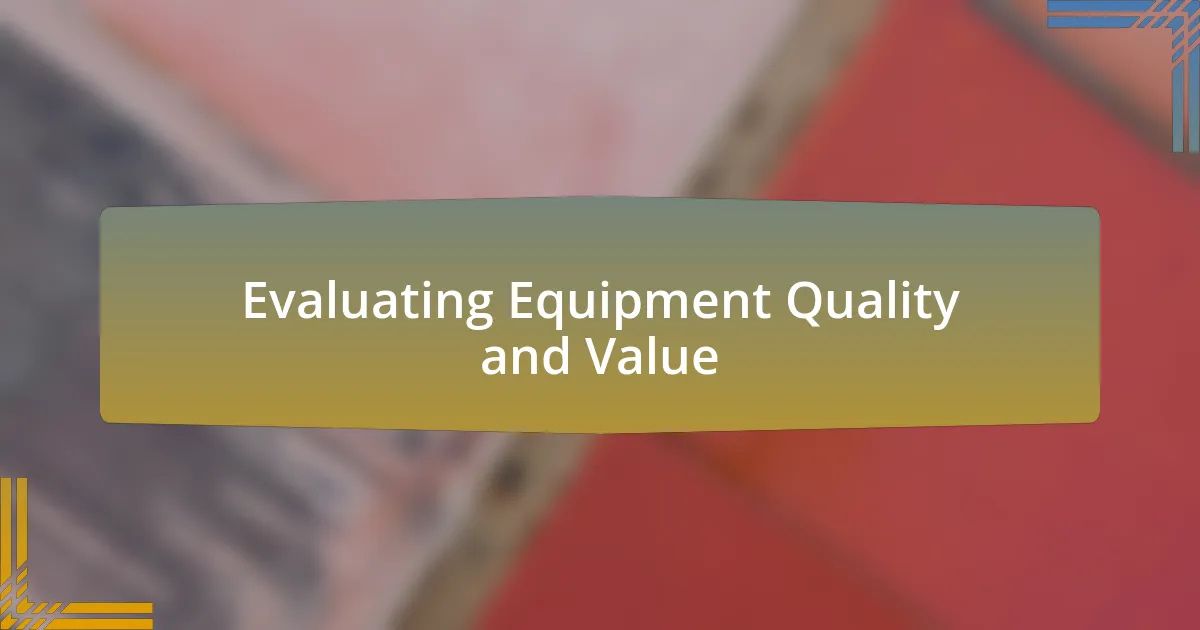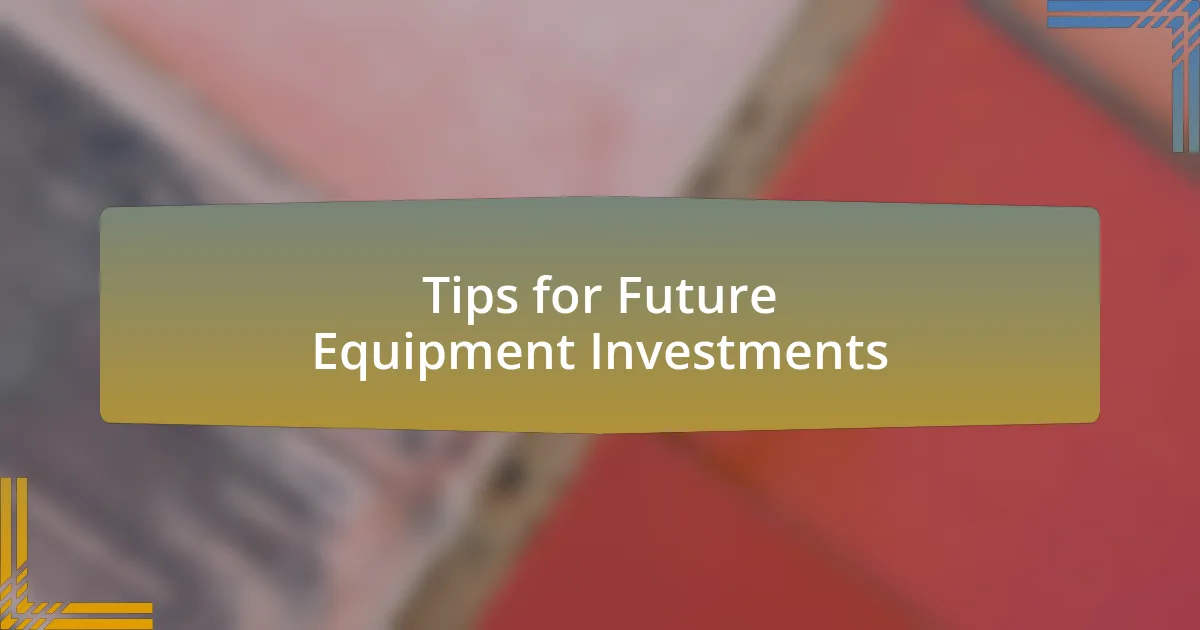Key takeaways:
- Understanding the nuances of equipment auctions is crucial for making informed investment decisions, considering both immediate and long-term potential.
- Networking and building relationships within the auction community can provide valuable insights and improve bidding strategies.
- Setting a clear budget, conducting thorough research, and knowing the market value of equipment are essential to avoid impulsive spending and ensure profitable investments.
- Evaluating the quality of machinery, including maintenance history and condition, can prevent costly mistakes and enhance the success of future acquisitions.

Understanding Equipment Auctions
Equipment auctions serve as dynamic marketplaces where buyers and sellers converge to trade a wide range of machinery and tools, often at competitive prices. I recall attending my first auction, feeling a rush of excitement mixed with trepidation as the auctioneer’s voice echoed through the crowd. Have you ever felt the electricity in the air when bids start flying? It’s a unique experience that combines strategy with gut instinct.
In the world of mining investments, understanding the nuances of these auctions can be a game changer. Each piece of equipment tells a story—its prior use, maintenance history, and the potential return on investment it might offer. I remember closely examining a drill rig that had seen better days but still held promise. The key is assessing not just the immediate value but the long-term potential.
Moreover, participating in equipment auctions requires familiarity with industry trends and pricing. Have you ever purchased something that seemed like a steal, only to discover hidden costs later? That’s a valuable lesson I learned when I underestimated the cost of refurbishing equipment. It’s crucial to approach these auctions with both enthusiasm and skepticism, ensuring you’re fully informed to make the best investment decisions.

Importance of Auctions in Mining
The significance of auctions in mining cannot be overstated. They are not just an avenue for purchasing equipment; they often dictate market trends and pricing structures in the industry. I remember attending a particularly competitive auction where a well-maintained excavator sold for much higher than I anticipated. It made me realize how passionate bidders can drive prices, reflecting not just the equipment’s worth but also its perceived value in the current market.
Auctions also provide an excellent opportunity for miners to acquire specialized machinery that may not be readily available on the open market. I once stumbled upon an auction featuring vintage equipment that had been meticulously maintained. It was fascinating to see how that piece of machinery, overlooked by many, held incredible potential for niche projects, opening up avenues I hadn’t considered before.
In addition to facilitating acquisitions, auctions foster a sense of community within the mining sector. Have you ever found yourself chatting with fellow bidders about the intricacies of a particular piece of equipment? That shared knowledge and passion creates valuable relationships that can lead to future partnerships. Reflecting on my experience, I believe these interactions are just as vital as the transactions themselves—it’s about building a network that thrives on mutual knowledge and trust.

Types of Equipment Commonly Auctioned
When it comes to mining equipment, certain types frequently dominate the auction landscape. For instance, heavy machinery like bulldozers and haul trucks often catch my eye due to their critical role in large-scale operations. I remember my first auction experience where a massive haul truck was up for bidding; the sheer scale of it struck me. The excitement in the room was palpable, as everyone recognized its potential to enhance productivity and efficiency.
Additionally, drilling rigs and support equipment frequently find their way onto the auction block. I recall bidding on a used drill rig that had a remarkable track record in resource exploration. Who knew that such a piece of equipment could carry so much history? Each scratch and dent told a story, and I felt a sense of connection to the countless projects it had been a part of. It’s intriguing how these tools become vessels of potential for various mining endeavors.
Lastly, auction-goers often encounter more niche equipment, such as underground mining tools and processing plants. I once witnessed an auction for a compact processing unit ideal for smaller operations. It was an eye-opener for me, realizing how tailored machinery can make a significant difference for smaller operations struggling to scale. The thrill of finding those unique pieces excites me, as they often present opportunities that can change the game for less established miners.

Strategies for Successful Bidding
When participating in equipment auctions, setting a clear budget is essential. I’ve learned the hard way that it’s easy to get swept up in the excitement of bidding and exceed my initial plans. Establishing a spending limit beforehand allows me to bid confidently without the stress of buyer’s remorse later.
It’s also helpful to conduct thorough research on the equipment you’re interested in. I once lost a bidding war over a haul truck because I didn’t realize how much its operating history mattered. Understanding the equipment’s condition, previous ownership, and market value can significantly impact your bidding strategy. So, have you ever considered how that knowledge could set you apart from other bidders?
Lastly, timing your bids can be a game-changer. I remember waiting for the last few seconds to make my move which created a strategic advantage. Sniping, or placing a final bid just before the auction ends, can catch others off guard. There’s a thrill in that moment, but it requires a disciplined approach and a good sense of the auction dynamics. Isn’t it fascinating how one well-timed bid can secure a fantastic deal?

Lessons from Personal Auction Experience
One of the most profound lessons I’ve gleaned from my auction experiences is the importance of patience. There was a particular auction where I felt the urgency to bid quickly, driven by the fear of losing out. However, after stepping back for a moment, I realized that waiting for the right opportunity not only saved me money but also led to better choices. Have you ever felt that rush to act only to regret it later? I certainly have, and it taught me that sometimes, the best strategy is to hold back until the moment is right.
I also discovered that networking with other bidders can provide invaluable insights. In one instance, I struck up a conversation with someone who had previous experience with the equipment I was eyeing. His tips about potential pitfalls completely shifted my perspective and gave me an edge in preparing my bids. Isn’t it interesting how a casual chat can transform your approach? This experience reinforced the idea that building relationships in the auction community can yield benefits beyond what meets the eye.
Moreover, I learned to keep my emotions in check, especially fear and excitement. I vividly recall a time when I was determined to win a particular piece of machinery, and the adrenaline kicked in as the bidding heated up. In that moment, I realized how easily emotions could cloud judgment. It’s a reminder that staying grounded and focused amidst the chaos of an auction can often lead to better decisions. Have you ever found yourself caught in an emotional whirlwind during a bid? I believe it’s crucial to take a step back and reassess to avoid overspending or making hasty decisions.

Evaluating Equipment Quality and Value
When evaluating equipment quality at an auction, I always find myself inspecting every inch of the machinery. I remember one auction where I noticed a small crack in the frame of a loader that others overlooked. That tiny flaw turned out to be a significant red flag regarding its overall condition. Have you ever found yourself questioning whether a minor issue could lead to bigger problems later? It’s essential to dig deeper than the surface-level appearance; thorough inspections can save you from costly repairs.
Another critical factor is understanding the equipment’s maintenance history. During one of my auctions, I asked the seller about service records for a series of trucks. Their detailed documentation not only demonstrated proper upkeep but also boosted my confidence in bidding. In your experience, how much more secure do you feel when you know the background of a machine? Having a clear maintenance track record can often highlight the difference between a wise investment and a potential disaster.
Lastly, I can’t stress enough the importance of knowing current market prices. I recall a time when I bid aggressively on a drill rig, only to later realize that I had exceeded its market value based on comparable sales. The surprise felt like a punch in the gut. Isn’t it frustrating to find out you could have saved money by doing a bit more homework? Staying informed about market trends can empower your bidding strategy, ensuring you make informed decisions that pay off in the long run.

Tips for Future Equipment Investments
One of the biggest lessons I’ve learned is the value of setting a budget before attending an auction. There was a time I got swept up in the excitement and bid more than I intended on a piece of heavy machinery that looked impressive but wasn’t quite what I needed. Have you ever felt the thrill of competition pushing you to spend beyond your plans? I realized that defining clear financial limits beforehand not only curbs impulsive decisions but also provides a foundation for making sound investments that align with your financial goals.
Another aspect I advise considering is the potential for future resale value. At one auction, I bought a well-built excavator that I believed could yield a good return down the line. After a year of use, I was pleasantly surprised to find similar models selling for significantly more. Have you thought about how a piece of equipment might perform in the secondary market? Being mindful of long-term value can turn your equipment purchases into strategic plays for profit.
Finally, diversify your equipment portfolio. When I first started bidding, I focused primarily on one type of machine, but that limited my options and reduced my flexibility. I learned the hard way when a single piece broke down, leaving me scrambling for a backup. What happens if a key piece of equipment fails? Investing in a variety of machines not only mitigates risk but also opens up opportunities to tackle different projects, enhancing overall profitability.